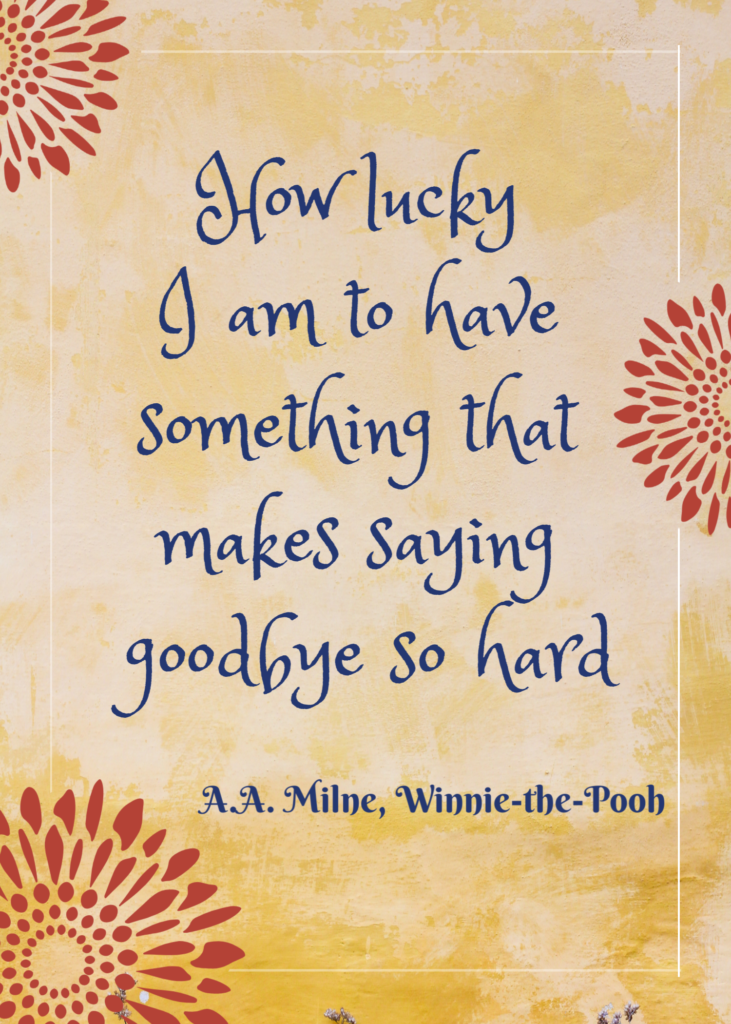
it’s good to be grateful for what has been
Two hours ago I found out that our family is being repatriated – this is big. How do I deal with the news of being sent home? To help me process and think through this, I decided to write down and share my reactions, questions and insights.
Below, I wrestle with several questions that go to the core of what it means to move to another international location, on this expat trail of life. These are the main issues that many other families face when relocating:
What will be the impact on our careers, childcare, housing, finances, relationships…?
While I have found resources on the logistical side of being repatriated like this checklist by CNN for US repatriates, and I have found resources on transitioning back into your ‘home’ culture, like this BBC article on “How expats cope with losing their identity“, I haven’t read any others experiences and reactions on receiving the news that they will be sent home. I therefore hope you find my experiences here insightful.
The roller-coaster of highs and lows
After hearing the news that our family is being repatriated I came back to our apartment, got the baby out of her wet clothes (rainy season), handed her to her nanny, and went and sat on the floor inside my bedroom closet. Then I lay down on the floor in the closet for a long time. This was the physical manifestation of how I felt on finding out the news that our family is being sent ‘home’. I feel heavy, I feel low. Lying on the floor feels fitting – giving in to gravity.
It is also a place that represents all the physical work that goes into an international move. There was a lot of unpacking, washing, drying, ironing, and organizing to arrange the closet all over again in our new apartment. It doesn’t feel so long ago we did that, and the thought of going through all that again in reverse, so soon, leaves me feeling frustrated.
As I lie there on the closet floor, I wonder why I am feeling and reacting this way.
I reflect on the many stages and emotions involved in finding out about our move overseas, during the move itself, throughout the first few months in our new city, when we heard we may be sent home, and my reactions now we know the final date we are expected to fly out.
It wasn’t always the case that I wanted to stay in Bangkok. Several months ago, during the high air pollution months of December, January and February, I would have been very happy to hear this news of our family being repatriated. But we have moved on from that, the air is good, we’ve built and adjusted to our new lives here and we’re in a different place mentally, now feeling comfortable in Bangkok.
Why does this news feel so heavy?
I try to nail down what I am feeling so deflated about. And I’m not even sure if ‘deflated’ is the accurate word, but nothing fits better. What’s really going on here? I ask myself a few questions to try and help myself understand what the real core of the issue is here.
Is it because this represents the end of a stage in my life that I longed for and planned for so long?

The short answer to this is “definitely yes”. In sadness and in nostalgia, I acknowledge this phase is nearing its end and I need to let go of it.
For the first half of my twenties, I did not want kids. For the second half of my twenties, I said “maybe in 5 years time”. In the first two years of my thirties, I convinced my partner to wait until I was ready for kids. Then we spent a couple of years trying to get pregnant unsuccessfully. Then we spent two very grueling years going through infertility treatments. Finally, we conceived and I could not believe my luck.
In my mind, for all the years (a decade) that I had thought about having kids in the future, or had been trying to get pregnant, I always knew that I wanted to have a couple years away from my career to be able to spend as much time as possible with my baby. Each mother and baby has their own situation and, if they’re lucky, their own choices on how to spend the first weeks, months and years before school begins. And, for me, I knew I wanted to stay home for a couple of years with my baby.
With this international move, I was able to make that happen for a couple of reasons.
First, I was able to avoid the stigma that parents can face in some countries due to taking time away from a career to focus on childcare. There is the issue of the questionable gap in your resume, there is the prepared response to “so what do you do?”, there is some stereotyping and can be some judgment. On the other hand, when you explain you’re accompanying your partner on an international transfer, you get the ‘trailing spouse’ label, but I have found it to be more acceptable in my own conscience than the ‘drop-out’ label I would get in a city of power-hungry over-achievers in the US. Going back ‘home’ I either have to get back into ‘over-achiever’ mode, or be the ‘drop out’. I don’t want either. I just want to spend lots of time with my baby on my own schedule.
Second, with all the benefits provided from my partner’s employer, we have been financially healthy on just one salary. That will most likely change when we go back ‘home’. We either have to get very frugal, or get a second income.
But I realize that, most of all, I am feeling very sad and nostalgic that this phase I planned for many years has now almost passed. This special, precious, short time when my baby is under one year old has come – and has now gone. I am struggling with that transition in my mind. Letting go of that is hard. The international move was like ‘book-ends’ on that chapter of my baby’s first 18 months in life, and now that our family is being repatriated, I will have finally let go of that phase.
Would I feel any different about our repatriation if I already knew I would have just as great childcare for my baby there as what I do here?
The answer here is “definitely yes”. When I got home after hearing the news, I changed the baby and handed her to her nanny. I watched them walk together through the living room and know that they have a close bond. I think she loves the baby. And the baby thinks she is wonderful. If the baby knows about love, she probably loves the nanny back too.
I sink further into the couch as I watch them for a few seconds. With a heavy heart I think of them separating.
And, a little later, as I lie on the closet floor, I think of how I will find such good care for the baby back ‘home’. It will be incredibly expensive for even just basic care, never mind one-on-one attention, food catered to her needs and tastes, and a carer that comes to the house, rather than having me run over town in traffic to drop her off – as well as having availability to provide additional care occasionally on evenings or weekends.
Yes, I know I probably sound spoiled. We have had such great care for the baby here in Bangkok, that other options sound much less appealing, as well as less convenient and much more expensive. While we have had friends with very mixed experiences with good and not-so-good nannies, we were always grateful to have found such a great nanny that fits well with our family. (If you’d like to read how we found and hired such a great nanny, you can read my advice here).
If I already had a plan for baby care when I get back ‘home’ I’m sure I would feel reassured that there will be great options there too, that both baby and I will feel happy with. But, for now, with the unknown and uncertainty, I am worried. I don’t want to rock this sweet sailing boat. And will get past this in time, with greater knowledge and clarity on options but, as our family is being repatriated, I know I’ll still have a heavy heart for leaving our current nanny.
I resolve to find out if there is a way we may be able legally to invite her to the US as our nanny there, and if we can financially afford that.
Would I feel any different about our repatriation if we were not returning to where we came from?
Would I feel any different if we were going somewhere new? The answer to these questions is, I believe, “definitely yes”.
And I believe this for two reasons: one is that moving back to where we were before can feel like moving backwards in our lives. Like we haven’t made any progress. Though I know we have gained so many experiences and memories living here in Bangkok, my heart still feels like we are moving back to something that we have already done before. I’m a person who gets bored easily and maybe one of its manifestations is that I like quite drastic changes in my life every few years. Going back to the same country and city is not a drastic change.
The second reason is that when we left ‘home’ we imagined that this move would be the first of more to come. We had already an idea of where we would like to go next. Unfortunately, with the structural changes within our employer’s organization, those options no longer exist.
I try to keep in mind this helpful quote:

Would I feel any different about our repatriation if I knew I wouldn’t return to the career that I had before I left ‘home’?
And that I would be able to pursue a career change? The short answer here is “yes”. I was unsatisfied with the job I was doing and the role I was performing before I left to go overseas. In some ways, having a baby and an international move all at the same time felt like a natural transition for me to move out of that career.
Now, however, our family is being repatriated with a return to the same city, and no real additional career experience while I have been in Bangkok, it seems likely in a tough job market (and an expensive housing market) to find oneself drawn down the path of least resistance. I fear myself needing to sell the previous 16 years work experience that I have developed, and succumbing to a career in the same field that I had hoped to grow beyond.
Would I feel any different about our repatriation if I knew our financial situation would be OK as a single income family?
The answer to this is “probably yes”. It’s tied up with the issue of job and career change. If I knew we would be financially stable on one income, I wouldn’t feel the same pressure to find a well-paid job. However, I don’t know what is feasible for our family to live on, and until we know that there is cause for some concern.
Would I feel any different about our repatriation if we were not returning to the house that we bought, but to another place?
“Probably” is the short answer here. The house we bought a few years ago was part of our investment strategy as a family. It was not a ‘fixer-upper’ in that we were able to move straight in, but neither was it in tip-top condition. For example, we moved in during the month of June when the temperature was 93F, and the house had no air-conditioning beyond the kitchen! We chose a house that needed certain upgrades so that we would be able to add value to the property.
The upshot of that was we lived in our house throughout the complete installation of a air conditioning system that never existed previously throughout the house, painters decorating every room, a bedroom ceiling that collapsed because of water leaks through the roof and, thereafter, plaster-work on the ceiling and installation of a new roof. Needless to say, this was all a lot of work, and a lot of mess to live in, as well as a lot of money needing to be spent. I was done with it by the time we left, and was looking forward to living in rented accommodation again where it would be someone else’s responsibility, time and money to fix things.
When we return I know there are various other upgrades needed such as new bathrooms and re-surfaced hardwood floors (the toilet flooded through the living room ceiling and damaged the floors while we were gone). These are not appealing projects to undertake. Yes, we signed up for an old house (mainly to live in a great location close to downtown, and because I am British and love old stuff), and we acknowledge extra work is the price for that. But still, these renovations will take months and it’s not an appealing task that lures one back.
How can I make the most of the time left…?
As I walked home after hearing the news, one pressing question that helped me to deal with it in a productive way and focus on the good was to start thinking through “how can I make the most of the time we have left in Bangkok?”.
I resolve to make a chart of all the things I would want to have experienced and have accomplished by the time we leave Bangkok. It includes volunteer work, art activities, sightseeing activities, a meditation retreat, a Thai cooking class and trips to a couple of spots around Thailand.
Time waits for no-one…
As I’ve been writing this piece, the afternoon’s gray fog and heavy tropical rains have turned into darkness with Bangkok’s skyscraper buildings and malls all lit up around us, sparkling away. I ready my baby for bed and, as is our nightly bedtime routine, we go around and close all the curtains and say “goodnight Bangkok, goodnight lights, see you tomorrow”. Only now we know the tomorrows are limited, and this phrase takes on new meaning. How to make the most of all the tomorrows we have left in Bangkok…?
(p.s. I often refer to home like this ‘home’, because neither my partner or I are actually from the place that we are being returned to, but it comes as close to what either of us consider our ‘home’ aside from where our parents live, in different countries. And it’s the place his employer recognizes as the ‘home’ or headquarter office).
Leave a Reply